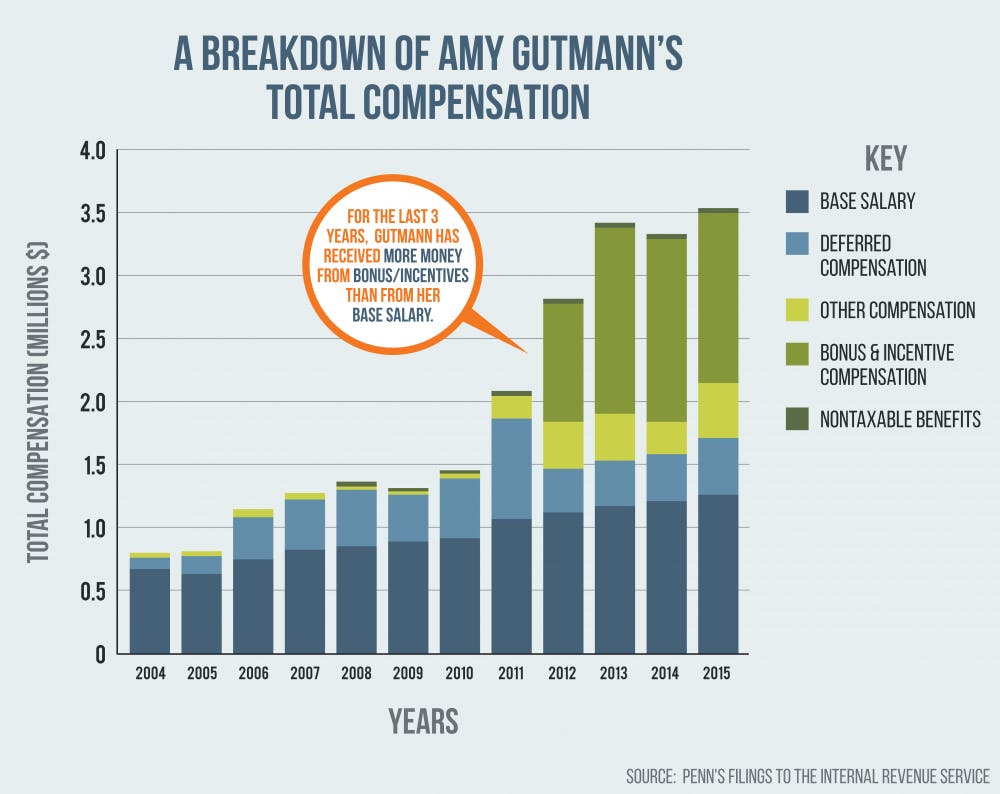Penn President Amy Gutmann who is already one of the highest-paid university presidents in the country, made over $3.5 million in 2015, a 6.09 percent rise from the previous year.
Her compensation package — which includes a base salary, incentive, bonus pay, as well as funds put away into a retirement plan — is set each year by a compensation committee comprising members of the Penn Board of Trustees and headed by Trustees chair, David L. Cohen.
Because of a lag in reporting requirements to the IRS, the pay Gutmann collected from July 1, 2015 to June 30, 2016 is the latest number available.
With salaries for college presidents increasing across the country, The Daily Pennsylvanian looked at what factors inform compensation decisions for Gutmann and other top Penn administrators.
What is the process the compensation committee uses to determine Gutmann's compensation each year?
Like a CEO or high-ranking financial executive, Gutmann's pay is largely performance-based.
The proportion of her total compensation that is pinned to performance — usually encapsulated under the category, "bonus and incentive compensation" — has risen dramatically in recent years.
For the first eight years she received a paycheck from Penn, Gutmann received zero dollars in bonuses or performance-driven pay. But in the last three years, her annual performance-based pay has exceeded her base salary, which isn't tied to performance.
Each year, Gutmann and Cohen "set very aggressive targets for her performance, touching on everything from fund raising to advancing innovation, class strength, improving student and faculty diversity, increasing financial aid, new capital projects, faculty recruitment, research priorities, and medical practice advances," among other priorities, Cohen wrote in an email to the DP.
Gutmann also writes a self-assessment, which the compensation committee measures against these previously set goals. The group then determines her base salary for the following year and compensation from incentives.
How did the compensation committee view Gutmann's work in 2015?
"For 2015, the Compensation Committee determined that, across a hugely complex institution, Dr. Gutmann had substantially met each and every one of her aggressive goals and has succeeded phenomenally," Cohen wrote in an email. "Indeed, we believe Amy Gutmann is the best university president in the country, and her compensation should reflect that."
While Cohen did not specify what metrics the committee used beyond that email, it's likely Gutmann's vastly successful fundraising efforts and commitment to globally expand Penn's footprint left the committee more than satisfied with her performance.
The University's endowment eclipsed $9.6 billion in September 2014, a remarkable 139 percent increase from just over $4 billion, the value of the fund at the end of 2004, the first year of Gutmann's presidency. (The endowment is now valued at over $10.7 billion.)
Penn's "Making History" fundraising campaign, which concluded in 2013, raised over $4.3 billion, well over its $3.5 billion goal and enough to make it the single-largest fundraising effort in University history.
Among Gutmann's other achievements during this period were a ceremonial groundbreaking for the Pennovation Center and the announcement of the Penn Wharton China Center in Beijing.
What other factors, beside Gutmann's own performance, influence how much money she is given?
At any university, the job of president "requires a very rare combination of academic stature, political skills, fund raising ability, leadership strength, and vision," Cohen said. "It is rare to find one person who possesses all those skills at an extraordinarily high level, and that influences the market for presidents."
For Penn specifically, the addition of a multibillion dollar medical complex to the president's portfolio of responsibilities makes for an especially demanding job.
"Penn is arguably the most complex university in the country," Cohen said, and compensation consultants interviewed for this piece largely agree.
Mark Borges of the firm Compensia, Inc. said Penn's complexity, in addition to its "stature in the academic community" and "prominence in our nation as one of the institutions of higher learning," likely inform Gutmann's outsized compensation.
At an institution of comparable complexity, Harvard University, President Drew Faust only earned $1.4 million in 2015, nearly 11 times less than Stephen Blyth, the former head of the Harvard Management Company, which manages the university's endowment. Blyth brought home $14.8 million, according to The Harvard Crimson, while Daniel Cummings, who manages the fund's real estate portfolio, made close to $11.5 billion.
Harvard's endowment, valued at $35.7 billion in September 2016, is the largest in the country.
Was Gutmann's increase in total compensation for 2015 unusual?
Despite dips in 2009 and 2013, Gutmann's pay has gone up every year since 2004, sometimes by margins as large as 43 percent (from 2010 to 2011). An increase of just over 6 percent is far from unusual for her and relatively modest compared to the massive jumps of years past.
While Gutmann is paid substantially more than the average president of a four-year, private university, compensation consultants said Penn's complexity, as a multibillion dollar institution containing a medical complex, merits her competitive salary.
"This is not a lot of money compared to how heads of private companies get paid," Borges said. "It could turn out that [Gutmann] is probably a bargain when you look at the realities of trying to replace that person in the current marketplace."
Another compensation expert, Paul Dorf of Compensation Resources, said, "The numbers themselves are not outlandish or outrageous by any stretch of the imagination. They’re in line with what I would expect, both at the University and the hospital."









